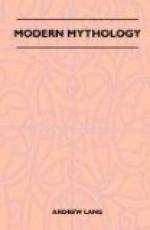Mr. Frazer and I
It is plain that where a people claim no connection by descent and blood from a sacred animal, are neither of his name nor kin, the essential feature of totemism is absent. I do not see that eaters of the bull Dionysus or cultivators of the pig Demeter {86} made any claim to kindred with either god. Their towns were not allied in name with pig or bull. If traces of such a belief existed, they have been sloughed off. Thus Mr. Frazer’s explanation of Greek pigs and bulls and all their odd rites, as connected with the beast in which the corn-spirit is incarnate, holds its ground better than my totemistic suggestion. But I am not sure that the corn-spirit accounts for the Sminthian mouse in all his aspects, nor for the Arcadian and Attic bear-rites and myths of Artemis. Mouse and bear do appear in Mr. Frazer’s catalogue of forms of the corn-spirits, taken from Mannhardt. {87} But the Arcadians, as we shall see, claimed descent from a bear, and the mouse place-names and badges of the Troad yield a hint of the same idea. The many Greek family claims to descent from gods as dogs, bulls, ants, serpents, and so on, may spring from gratitude to the corn-spirit. Does Mr. Frazer think so? Nobody knows so well as he that similar claims of descent from dogs and snakes are made by many savage kindreds who have no agriculture, no corn, and, of course, no corn-spirits. These remarks, I trust, are not undiscriminating, and naturally I yield the bull Dionysus and the pig Demeter to the corn-spirit, vice totem, superseded. But I do hanker after the Arcadian bear as, at least, a possible survival of totemism. The Scottish school inspector removed a picture of Behemoth, as a fabulous animal, from the wall of a school room. But, not being sure of the natural history of the unicorn, ‘he just let him bide, and gave the puir beast the benefit o’ the doubt.’
Will Mr. Frazer give the Arcadian bear ‘the benefit of the doubt’?
I am not at all bigoted in the opinion that the Greeks may have once been totemists. The strongest presumption in favour of the hypothesis is the many claims of descent from a god disguised as a beast. But the institution, if ever it did exist among the ancestors of the Greeks, had died out very long before Homer. We cannot expect to find traces of the prohibition to marry a woman of the same totem. In Rome we do find traces of exogamy, as among totemists. ’Formerly they did not marry women connected with them by blood.’ {88a} But we do not find, and would not expect to find, that the ‘blood’ was indicated by the common totem.




